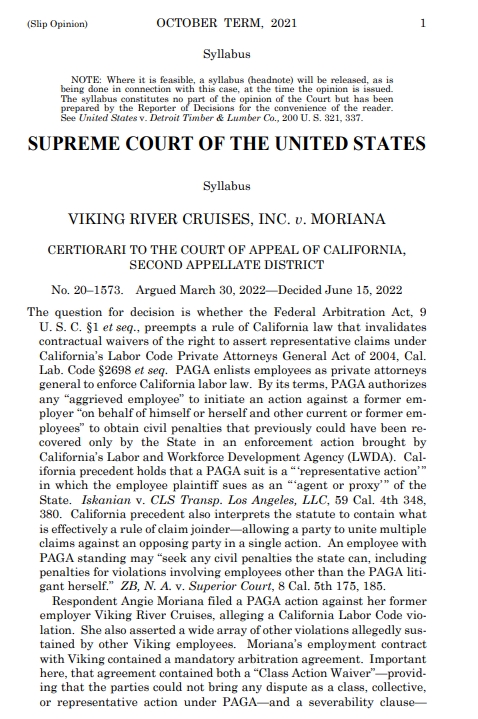Today, the United States Supreme Court issued its highly anticipated decision in Viking River Cruises v. Moriana, which decided whether the Federal Arbitration Act (FAA) preempts California’s rule invalidating arbitration agreement provisions that contain a waiver of the right to bring a representative action under the Private Attorneys’ General Act of 2004 (PAGA).
The Court held that the FAA preempts the ruling of Iskanian v. CLS Transportation Los Angeles, LLC “insofar as it precludes division of PAGA actions into individual and non-individual claims through an agreement to arbitrate.”
This new decision is yet another in a long line of cases reflecting the Court’s pushback against state laws and judicially created doctrines that undermine the FAA.
This is a big win for employers with operations in California.
The Court’s decision is technical and nuanced, but the key takeaway is that employers can take steps to mitigate the risk of costly representative PAGA actions in California by implementing and enforcing arbitration agreements containing PAGA waivers that require an employee to submit their individual claims to final and binding bilateral arbitration.
For California employers, PAGA likely needs no introduction. For nearly two decades, PAGA has enabled employees in California to “stand in the shoes” of the Labor and Workforce Development Agency (LWDA) to recover civil penalties for any violation of the California Labor Code. In a successful PAGA action, the LWDA is entitled to 75 percent of the penalties, and the remaining 25 percent goes to “aggrieved employees.”
As the Court observed in Viking River, individual “penalties are modest; but given PAGA’s additive dimension, low-value claims may easily be welded together into high-value suits.” In other words, because “PAGA plaintiffs represent a principal with a potentially vast number of claims at its disposal, PAGA suits ‘greatly increase[e] risks to defendants.’ ” California employers are all too familiar with these risks and the significant potential for substantial liability for minor, trivial violations of the California Labor Code.
For several years, employers attempted to limit the risks of costly representative PAGA actions by implementing arbitration agreements with PAGA waivers. However, in 2014, the California Supreme Court issued its ruling in the Iskanian case holding that pre-dispute agreements to waive the right to bring “representative” PAGA claims are categorically invalid as a matter of public policy.
According to the California Chamber of Commerce, after the Iskanian decision, annual PAGA filings more than doubled, from 2,000 per year to more than 4,000 per year, and they have continued to rise with each passing year. Because of the highly punitive nature of PAGA penalties, even smaller employers confront cases giving rise to millions of dollars of potential liability.
While the Court’s decision in Viking River is a huge win for employers in California, it is not without limits. The Court held that “Iskanian’s prohibition on wholesale waivers of PAGA claims is not preempted by the FAA.” This means that employees in California may still pursue PAGA penalties on an individual basis in arbitration. However, the Court made it clear that Iskanian’s rule that “PAGA actions cannot be divided into individual and non-individual claims is preempted,” which compelled enforcement of the employer’s arbitration agreement to send the individual employee’s claims to arbitration. The Court held that once an employee’s individual PAGA claim is submitted to arbitration, the employee lacks standing to pursue representative PAGA claims in Court.
While a victory for employers, this ruling is not the end of PAGA. As Justice Sotomayor’s concurring opinion observed, the Court based its decision on “available guidance from California courts” regarding state-law rules of standing. She quickly noted that “if this Court’s understanding of state law is wrong, California courts, in an appropriate case, will have the last word. Alternatively, if this Court’s understanding is right, the California Legislature is free to modify the scope of statutory standing under PAGA within state and federal constitutional limits.” The next few years are sure to deliver further development of the law in the PAGA arena, particularly given California’s public policy in enforcing the Labor Code and recovering civil penalties—which have been a huge boon to the LWDA’s coffers.
For now, employers should consult with legal counsel to review, revise, or prepare arbitration agreements containing valid PAGA waivers within the limits established in Viking River.
As many employers will recall, in 2019, California passed a law prohibiting employers from requiring employees to sign arbitration agreements as a condition of employment. That law was set to take effect on January 1, 2020, but is currently undergoing legal challenges. Most recently, a panel of the Ninth Circuit upheld most of this law, but the California Chamber of Commerce petitioned the Ninth Circuit for a rehearing en banc, in which the entire appeals court will re-analyze the matter. Given this uncertainty, it is critical that employers work with experienced employment counsel to ensure that their arbitration agreements have the greatest chance of being upheld and enforced in court.




 Today, the United States Supreme Court issued its highly anticipated decision in Viking River Cruises v. Moriana, which decided whether the Federal Arbitration Act (FAA) preempts California’s rule invalidating arbitration agreement provisions that contain a waiver of the right to bring a representative action under the Private Attorneys’ General Act of 2004 (PAGA).
Today, the United States Supreme Court issued its highly anticipated decision in Viking River Cruises v. Moriana, which decided whether the Federal Arbitration Act (FAA) preempts California’s rule invalidating arbitration agreement provisions that contain a waiver of the right to bring a representative action under the Private Attorneys’ General Act of 2004 (PAGA).